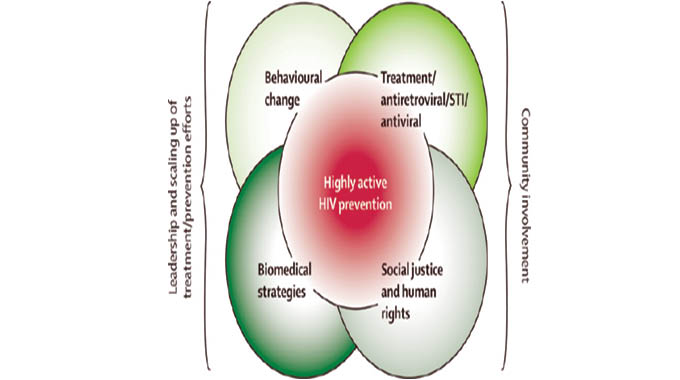Let’s scale up HIV PrEP roll-out in Zim

Paul Sixpence, Correspondent
OUT of a population of 14 million, about 1,2 million Zimbabweans are living with HIV. The big question is: how can we stop new infections?
Among many options available, scaling up HIV Pre-Exposure Prophylaxis (PrEP) roll-out to people at risk could help in stopping new infections.
As of this month, about 11 000 people had been initiated on PrEP since its regulatory approval in 2016. Zimbabwe is a HIV high burden country with thousands of new infections each year which makes the call for urgent, large scale PrEP roll out even more prudent.
PrEP is when an HIV negative individual at risk of contracting HIV takes a daily pill to prevent infection before engaging in a possible risky sexual encounter.
PrEP is highly effective in stopping HIV from taking hold and spreading throughout an individual’s body.
Over the years, Zimbabwe has witnessed a decline in new HIV infections. The health ministry in 2017 recorded over 40 000 new infections and in 2018, new infections declined by five percent. There is an urgent need to continuously work towards reducing new infections.
PrEP gives agency to sexually subordinate groups in society to make safe sex choices without negotiating with their partners. Adolescent girls and young women (AGYW) are disproportionately affected by HIV.
UNAids notes that in 2018, new infections among AGYW aged 15 to 24 years were more than double compared to those of young men within the same demographic group in Zimbabwe.
In light of the ambitious but very important UNAids 90-90-90 target, PrEP scale up and roll-out provides an opportunity to halt new infections and contribute towards the realisation of UNAids vision to end the Aids epidemic by 2020.
The 90-90-90 target aims to have 90 percent of all people living with HIV to know their HIV status; 90 percent of all people diagnosed with HIV infection to receive sustained antiretroviral therapy (ART); and 90 percent of all HIV-diagnosed people receiving sustained ART to achieve viral suppression. Achieving zero stigma is the fourth target.
Research results presented at the 2018 International Aids Conference from a study that was conducted in the United States of America indicated that, in 19 US cities with the highest HIV incidence rates that had adopted a “fast track” strategy in delivering PrEP to at risk individuals, they had nearly 16 percent fewer diagnoses than cities with the lowest rates, after adjusting for the proportion of people with HIV on treatment with suppressed viral loads.
Sexual minorities in Zimbabwe mostly live reclusively owing to negative societal attitudes, stigma and discrimination.
However, on paper, the country has progressive HIV prevention and treatment policies that promote non-discrimination and equal access to services irrespective of gender and sexual orientation. In that light and motivated by the need not to leave anyone behind in delivering the final solution to HIV, PrEP offers sexual minorities an HIV prevention option.
Illicit sex among adolescents and young people is on the increase and we can no longer afford to ignore this reality. In the interest of generational justice, availing PrEP to young people at high risk will not only stem the tide on new HIV infections but also help to secure their future.
In any discussion of this nature, more often than not, policy makers plead poverty (cost) as an inhibiting factor. However, studies have shown that the cost of keeping an individual on lifetime ART is greater than the cost of PrEP.
PrEP Watch notes that in Zimbabwe, the US President’s Emergency Plan for Aids Relief (PEPFAR) Country Operating Plans (COP) for 2019 aims to reach out to just over 3 200 people. Noting the high number of new infections it is imperative that PEPFAR increases its support for biomedical HIV prevention efforts that are centred on expanded PrEP roll out.
The Global Fund for HIV, Tuberculosis and Malaria through its Country Coordinating Mechanism (CCM) should prioritise the scaling up of PrEP roll out to key populations. International development partners who support the Global Fund must increase their support to enable the fund to support pharmalogical HIV prevention interventions.
The Government, through the health ministry and the National Aids Council (Nac) bears a duty of responsibility to avail pro-active public health interventions to its citizens to avert public health harm.
Despite the economic and financial challenges that the State may be facing, standing international human rights principles place an obligation on the Government to secure the well-being and health of its people. Efforts by Nac in delivering PrEP are commendable but must be scaled up.
Globally, it has been 50 years since the first ever Aids death was recorded in the US. Scaling up PrEP access will reverse the spectre of Aids. It will also give individuals and communities living on the margins and most affected by HIV hope and an opportunity to pursue their dreams and full potential.
The socio-economic impact of HIV and Aids on Zimbabwe can no longer be ignored. PrEP together with other biomedical and sociological interventions can deliver the final solution to this epidemic.
– Paul Sixpence is a human rights, biomedical HIV prevention and treatment advocate. He works with the Centre Stage Media Arts initiative. He can be contacted on: [email protected]











Comments